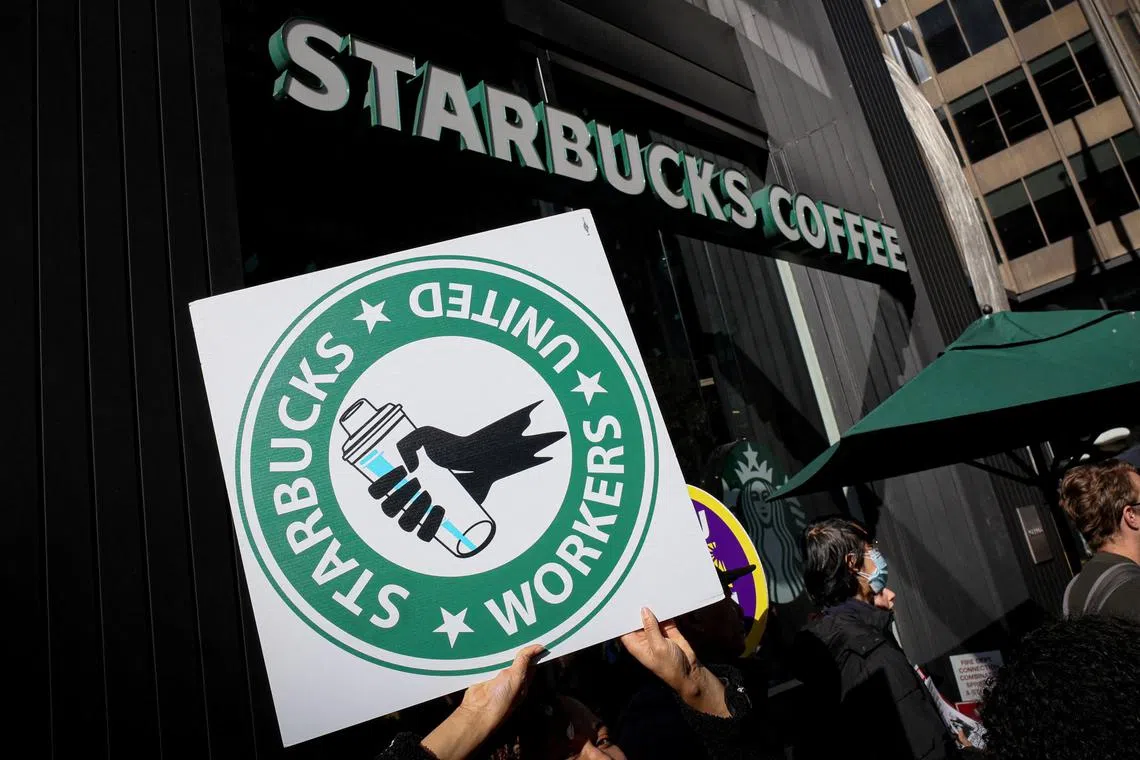Starbucks threatens to fire staff who do not go back to office
Sign up now: Get ST's newsletters delivered to your inbox

Starbucks is the latest company to shift from carrots to sticks in the ongoing return-to-office battle that has been playing out at workplaces.
PHOTO: REUTERS
Follow topic:
CHICAGO - Starbucks is telling its corporate staff they could be fired if they do not go to work at the office three days a week.
Starting in January, Starbucks will implement a “standardised process” to hold workers accountable if they do not abide by the coffee chain’s return-to-office (RTO) policy, according to a memo sent to one of the company’s divisions that was seen by Bloomberg News. Consequences are “up to, and including, separation”, the e-mail said.
The message marks an escalation in enforcement of the company’s hybrid work rules less than two months after Mr Brian Niccol took over as chief executive. He told employees in September that they should work wherever they need to in order to get their jobs done, but that he thought that place was usually the office.
Starbucks said its expectations for hybrid workers had not changed and that holiday, sick time and business travel are excluded from the calculation. Workers can request an exemption from the mandate due to physical, mental, sensory impairment or another disability, the company said. The policy applies to about 3,500 corporate employees. Most of them are employed at its stores.
“We are continuing to support our leaders as they hold their teams accountable to our existing hybrid work policy,” the company said in a statement on Oct 28.
Starbucks is the latest company to shift from carrots to sticks in the ongoing return-to-office battle that has been playing out at workplaces. In September, Amazon CEO Andy Jassy surprised employees with a memo ordering them to start reporting to their desks five days a week, beginning in January. Amazon Web Services CEO Matt Garman
Earlier in 2024, Dell Technologies told workers who chose to remain remote that they would not be eligible for promotion, and Wall Street banks have also warned that working from home could jeopardise career prospects. Still, offices in the biggest US cities remain half empty compared with pre-pandemic levels, according to security firm Kastle Systems.
At the same time, some firms have realised that an RTO mandate can serve as layoffs in disguise. In a survey from BambooHR, one in four executives admitted they hoped for some voluntary turnover in the wake of an RTO push. Research has shown, though, that the workers who quit due to the policies are often the more experienced staff that companies can least afford to lose.
Early in 2023, when Starbucks tried to enforce its hybrid-work mandate, dozens of corporate workers signed an open letter pushing back.
Mr Niccol’s own work arrangement, which lets him live in California and travel 1,600km to Seattle on the company’s corporate jet, sparked backlash from some workers and outside critics. Starbucks has said that Mr Niccol will spend most of his time in Seattle or visiting stores. Some staff had said they did not care where the CEO was based, as long as he did not crack down on in-office requirements. BLOOMBERG

